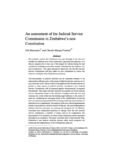Please use this identifier to cite or link to this item:
https://cris.library.msu.ac.zw//handle/11408/1336Full metadata record
| DC Field | Value | Language |
|---|---|---|
| dc.contributor.author | Manyatera, Gift | - |
| dc.contributor.author | Fombad, Charles Manga | - |
| dc.date.accessioned | 2016-05-16T15:27:54Z | - |
| dc.date.available | 2016-05-16T15:27:54Z | - |
| dc.date.issued | 2014 | - |
| dc.identifier.uri | http://www.unisa.ac.za/default.asp?Cmd=ViewContent&ContentID=13488 | - |
| dc.identifier.uri | http://www.repository.up.ac.za/dspace/bitstream/handle/2263/40679/Manyatera_Assessment_2013.pdf?sequence=1&isAllowed=y | - |
| dc.identifier.uri | http://hdl.handle.net/11408/1336 | - |
| dc.description.abstract | The political turmoil that Zimbabwe has gone through in the last two decades has affected most of its institutions, especially the judiciary. It is thus no surprise that it was one of the targets for reform during the last constitution-building process that recently culminated in the adoption of a new Constitution. This paper attempts to assess the role that the Judicial Service Commission will play under the new constitution to restore the battered credibility of the Zimbabwean judiciary. The mechanisms of judicial selection are an important element of an independent judiciary and a wide range of judicial selection systems are in use across the world. This in itself is a recognition of the fact that there is no perfect or ideal system of judicial selection. Zimbabwe's new Judicial Service Commission will be assessed against internationally recognised benchmarks. This paper will also examine the popular use of the judicial service commission model in the selection of judges across the civil and common law divide which are the leading legal traditions in the world. It starts by considering the emerging trends in the establishment of judicial service commissions generally before focusing on the key characteristics of judicial service commissions. The analysis of the new judicial appointments system is preceded by a brief overview of the pre- and post-independence judicial selection processes. In assessing the prospects for an efficient, competent and independent judiciary to emerge from the new judicial service commission, a number of issues such as its composition, the appointment of its members, the status of the commission and its operating procedures are examined. The paper concludes that if implemented fully, Zimbabwe's new judicial selection process offers better prospects for enhancing the independence of the Zimbabwean judiciary. | en_US |
| dc.language.iso | en | en_US |
| dc.relation.ispartofseries | Comparative and International Law Journal of Southern Africa;Vol. 47, No. 1; p. 89-108. | - |
| dc.subject | Zimbabwean judiciary | en_US |
| dc.title | An assessment of the Judicial Service Commission in Zimbabwe’s new Constitution | en_US |
| dc.type | Article | en_US |
| item.languageiso639-1 | en | - |
| item.grantfulltext | open | - |
| item.openairetype | Article | - |
| item.fulltext | With Fulltext | - |
| item.openairecristype | http://purl.org/coar/resource_type/c_18cf | - |
| item.cerifentitytype | Publications | - |
| Appears in Collections: | Research Papers | |
Files in This Item:
| File | Description | Size | Format | |
|---|---|---|---|---|
| Manyatera_Assessment_2013.pdf | Abstract | 556.85 kB | Adobe PDF |  View/Open |
Items in MSUIR are protected by copyright, with all rights reserved, unless otherwise indicated.



